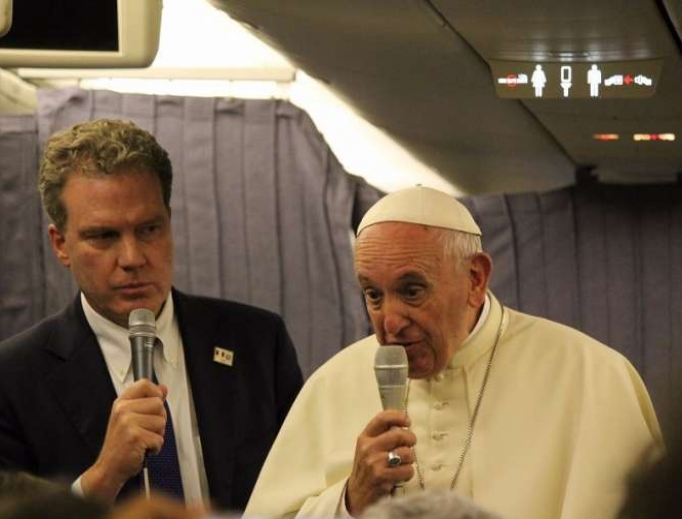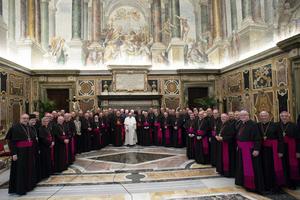Chile Faux Pas the Latest of Pope Francis’ Interview Missteps
COMMENTARY: Alongside the Pope’s recent apology for his remarks during his last trip, there have been other notable examples of papal mistakes.

On his return flight from Peru, Pope Francis asked pardon for a brief press interview he gave while in Chile, wherein he said that those accusing Bishop Juan Barros of Osorno of covering up sexual abuse were engaged in “calumny.” That created such an uproar that Cardinal Sean O’Malley of Boston publicly criticized the papal statement. Hence the apology on the plane home.
Andrea Tornielli, a Vatican correspondent close to the papal household, took note, saying that the apology “will go down in history as the first explicit and public mea culpa of a Pope who acknowledges his own mistake (and not that made by his predecessors in a distant past).”
Whether that is true or not, it is certainly not the first time that Pope Francis has made a serious mistake in his press interviews.
“I have made a mistake two or three times in my way of saying things,” Pope Francis told Dominique Wolton in an interview book published last year, Politique et Societé. “On the plane: Two or three times, I’ve made a mistake.”
The Holy Father doesn’t specify when he made mistakes, and Bolton doesn’t ask, but in light of what happened after the Chile-Peru trip, we can consider examples of when the Holy Father thought he made a mistake.
The Chile interview clearly was a mistake. After returning to Rome, Pope Francis faced a new reality. The international secular press, and the liberal Catholic press, were fiercely critical. It was not only that the mistakes were serious matters in themselves, but the Holy Father had alienated his most loyal supporters. A quick U-turn was thus effected, with the announcement that the top sexual-abuse prosecutor of Pope Benedict XVI, Archbishop Charles Scicluna of Malta, would be sent to Chile to investigate what the Vatican statement called “new information.”
It turned out later that actually Pope Francis had been in receipt of a letter for nearly three years that details claims of victims against Bishop Barros. Regardless of the past handling of this file though, the dispatching of Archbishop Scicluna likely means that the Holy Father has decided to remove Bishop Barros, a complete reversal of what he said on the plane. Archbishop Scicluna is sent not to exonerate but to execute.
The abrupt reversal is the pattern when an airborne mistake is made. Consider two other examples — perhaps the two the Holy Father had in mind last year.
Returning from the Philippines in January 2015, Pope Francis said that Catholics do not have to “breed like rabbits.” He then went on to relate an anecdote about how he chastised a mother on a visit to a Roman parish for being “irresponsible”; she had had seven Caesarian deliveries.
The personal condemnation of a specific woman was remarkably harsh, as she would have been easily identifiable by the facts the Holy Father gave. It was the “rabbits” comment, though, that created international headlines, and many Catholic parents of large families were hurt. While condemning the individual woman, the Holy Father was at least insensitive to the Catholic families who make great sacrifices to welcome many children.
Upon returning to Rome, the Holy Father realized his mistake and corrected himself at the next Wednesday general audience, saying that it gave him “consolation and hope to see so many large families who welcome children as a true gift of God.”
Another clear example of the papal news conference gone awry were the remarks Pope Francis made after the killing of Father Jacques Hamel in July 2016. Father Hamel, in his 80s, had his throat slit by Islamist extremists while offering the Holy Mass.
While secular France was horrified, the initial reaction of Pope Francis, airborne to Poland, was to dismiss the killing as something akin to domestic violence, controversially saying that a jihadist killing a priest at the altar had as much to do with religion as a Catholic man killing his girlfriend.
When that reaction was widely found to have missed the mark, the Holy Father lurched in the opposite direction, with the Holy Father offering a memorial Mass several weeks later at Santa Marta, with Father Hamel’s bishop and members of his parish present. There, Pope Francis told the bishop to display Father Hamel’s picture in the church because he was a martyr, already “blessed.”
What other mistakes does the Holy Father consider he has made on the papal plane? We don’t know.
The most famous remark of all — Who am I to judge? — in relation to a question about a priest allegedly guilty of homosexual misconduct, cannot be considered a mistake in the mind of the Pope. When he thinks he has made a mistake, he makes a bold correction. That remark has been allowed to stand, with only minor clarification.
Another instance might be the comments after the Charlie Hebdo terror attacks, when the Holy Father said that such a reaction was not a surprise if insults are given. It came off as blaming those killed for their own murders, but there was no significant U-turn on that issue.
There haven’t been many mistakes, Pope Francis says, but when he has made one, the correction is dramatic. Bishop Barros, not long for his diocese in Chile, is about to discover that.
Father Raymond J. de Souza is the
editor in chief of Convivium magazine.
















